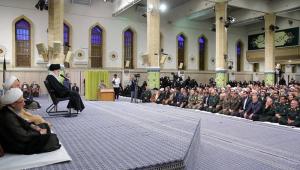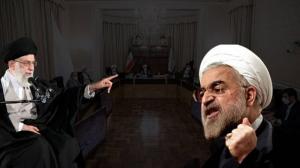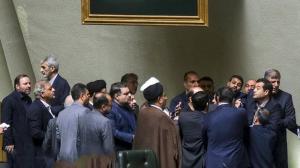
At the threshold of holding the new presidential election shows that while the new parliament has yet to commence its work, power struggles are underway at various levels in Tehran. led to shouting and confrontation in the open session of the ( Majlis).
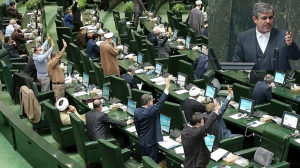
Tajgardouna new member of the regime’s legislative arm, was previously accused by representatives of “rent-seeking,” “corruption,” and “nepotism,” among other charges. On July 8, 2020, the representatives of the eleventh parliament rejected his credentials.
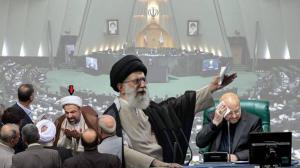
Hamid Rasaee, a member of the Paydari Front, stated that “one person in the parliament threatened Mr. Shariati and Mr. Salimi, saying that he would not let them reach their homes at night.”Rasaee called it ‘the disgrace of the parliament’.
Hamid Rasaee, stated that “one person in the parliament threatened Mr. Shariati and Mr. Salimi, saying that he would not let them reach their homes at night.”
— NCRI
PARIS, FRANCE, June 1, 2024 /EINPresswire.com/ — The National Council of Resistance of Iran (NCRI) Foreign Affairs Committee in an article published at the threshold of holding the new presidential election shows that while the new parliament has yet to commence its work, power struggles are underway at various levels in Tehran.
Today, May 30, the review of Gholamreza Tajgardoun’s credentials, a new member of the regime’s legislative arm, led to shouting and confrontation in the open session of the Islamic Consultative Assembly (also called the Majlis). This occurred despite Supreme Leader Ali Khamenei’s warning to the MPs to avoid “divisive rhetoric, quarrels, and enemy-pleasing disputes.”
On Thursday morning, a verbal clash over the issue arose between Malek Shariati and Gholamreza Tajgardoun, which led to MPs pushing each other while one told the other “I’ll cut you in pieces.”
Hamid Rasaee, a member of the Paydari Front, stated that “one person in the parliament threatened Mr. Shariati and Mr. Salimi, saying that he would not let them reach their homes at night.”
Reports indicate that a group of MPs insisted that the credentials of some of their peers, including Tajgardoun, be put to a vote in the parliament. However, Mohammad Bagher Ghalibaf, the Speaker of the Parliament, dismissed the protest, stating that the relevant committees had approved the credentials.
Tajgardoun was previously accused by several representatives of “rent-seeking,” “corruption,” and “nepotism,” among other charges. On July 8, 2020, the representatives of the eleventh parliament rejected his credentials with 102 opposing votes, 128 approving votes, and 21 abstentions.
Continuous fighting over influence
Meanwhile, media outlets aligned with various factions continue to engage in blame games, targeting and shaming senior state officials. This finger-pointing and public airing of grievances only underscore the political theatrics.
The state-run Emtedad wrote, “Ghalibaf, who received only five percent of the eligible votes in Tehran, was elected as the first Speaker of the twelfth parliament. While the two branches of principlists strangely opposed each other, in the vice-presidential competition, Hamid Rasaee received only 36 votes.”
Tasnim News Agency wrote about the behind-the-scenes efforts to silence internal opposition to Ghalibaf’s presidency, “The path of the belligerents was blocked. Some controversial presidential candidates did not reach the executive board with minimal votes.”
MP Jabar Kouchaki Nejad also spoke about factional conflicts: “The principlist faction was divided from the very first day. If the independents had not voted for Ghalibaf, he would not have become the Speaker.”
Furthermore, state media reported a significant incident during the vote counting for the parliament’s executive board. An astonishing error occurred in the tally for the vice-presidential seats, with the recount revealing that only the blank votes had been correctly counted.
The state-run Eghtesad News wrote on May 29, “The twelfth parliament officially started its work while a unique error in counting the votes for the executive board caused an uproar and widespread reaction from political figures; an error that evidence suggests was repeated in three stages of the previous day’s elections, with Hamid Rasaee calling it ‘the disgrace of the parliament’ and Amirhossein Sabeti calling it ‘astonishing to the representatives’.”
Citing the internal parliamentary conflicts over the presidency and executive board seats, the Bahar News website, affiliated with former president Mahmoud Ahmadinejad, wrote on May 29, “This was Ghalibaf’s first challenge, and rivals who lost in the fight over the parliamentary presidency, will retaliate in the presidential election competitions.”
Old wounds opened
Moreover, as the presidential election spectacle approaches, the internal power struggle within the clerical dictatorship intensifies. The former Supreme National Security Council spokesman responded to statements from former president Hassan Rouhani’s office concerning Ali Shamkhani’s role in the failure of the 2015 Iran nuclear deal by threatening to expose Rouhani.
Keyvan Khosravi stated that if the opportunity to present and discuss the “nuclear issue details” arises, “Shamkhani has much to reveal about this case,” which will “clarify the roles, services, and betrayals.”
Yesterday, parts of Mahmoud Vaezi’s interview with the Etemad annual release were published, in which the former President’s office had said that during the “JCPOA revival,” if the “Secretariat of the Supreme National Security Council had been aligned, the JCPOA issue could have been easily resolved.”
Reacting to these remarks, Khosravi, said, “Using national security issues to pursue political and factional goals, which forms the essence of Mr. Vaezi’s remarks, is behavior contrary to professional principles and national interests.”
Shamkhani’s name has recently been prominently featured in state media. Some outlets, about the death of Foreign Minister Hossein Amir-Abdollahian, report that Shamkhani has assumed responsibility for Iran’s nuclear negotiations. When asked if Shamkhani had taken on this role, Acting Foreign Minister Ali Bagheri Kani neither confirmed nor denied the claim.
Conflicts between the presidency and the Supreme National Security Council are not unprecedented. In 2005, Mahmoud Ahmadinejad assumed the presidency and soon after clashed with Hassan Rouhani, then the Supreme National Security Council Secretary, over nuclear negotiations.
Ali Larijani, who succeeded Rouhani at SNSC, also clashed with Ahmadinejad and stepped down from his position after about two years.
Despite the depth and volume of accumulated conflicts within the clerical regime, it is evident that the situation has slipped out of Khamenei’s control. Khamenei, who frequently calls for unity and cooperation in his public speeches, now faces an unprecedented level of rivalry and high stakes.
The Supreme Leader is caught between conceding to various factions and advancing his strategy for the regime’s survival, a dilemma that is likely to result in Tehran’s usual playbook of exporting crises abroad.
In a press announcement by Ahmad Vahidi, the Iranian regime’s Minister of Interior, the registration for presidential candidates has commenced and will continue for five days. This process follows the death of Ebrahim Raisi, the regime’s president, in a helicopter crash on May 19.
Following the death of Raisi and other senior officials, Supreme Leader Ali Khamenei called on state officials to promptly set the stage for new elections and make sure there is no void or reason for unrest.
Following the regime’s constitution, a new presidential election must be held within 50 days in the event of a president’s death. Therefore, the registration period for presidential candidates will remain open until June 3. Subsequently, the Guardian Council will have seven days to vet “the candidates’ qualifications.”
Mohsen Eslami, spokesperson for Iran’s Election Headquarters, informed ISNA News Agency that “in the initial hours, 30 individuals came forward to register as presidential candidates, but none met the necessary qualifications for definitive registration after document review.”
According to the schedule released by the Ministry of Interior, the final list of approved candidates will be announced on June 11. Historical patterns suggest that only those candidates approved by the Guardian Council a body that operates under the directives of the Supreme Leader will be allowed to participate in the sham election.
In the last presidential election in 2021, the Guardian Council disqualified a significant number of prominent political figures, including former president Mahmoud Ahmadinejad, then-Vice President Eshaq Jahangiri, and even former Speaker of Parliament and Khamenei’s advisor Ali Larijani.
The sham election was met with an unprecedented overwhelming boycott by the Iranian people and the blank vote came in second after Ebrahim Raisi.
The upcoming election, originally scheduled for June 2026, has been advanced due to Raisi’s death and will now occur on June 28. As the clerical regime readies for this expedited electoral cycle, the political atmosphere remains fraught, with the regime’s tight grip on candidate approvals expected to fuel factional strife and conflict.
On Thursday, May 29, despite Khamenei’s efforts to mitigate political tensions within the newly formed 12th parliament, heated discussions among its members and protests against the Parliament Speaker’s decision on whether to proceed with a vote erupted into physical altercations.
If you wish to receive the NCRI weekly Newsletter, please use the following link to subscribe: https://bit.ly/3SMgEla.
Shahin Gobadi
NCRI
+33 6 61 65 32 31
email us here
On Thursday morning, a verbal clash arose between MPs, which led to MPs pushing each other while one told the other “I’ll cut you in pieces.”
![]()
Originally published at https://www.einpresswire.com/article/716426036/video-dual-elections-ignite-power-struggles-within-iran-s-political-landscape

